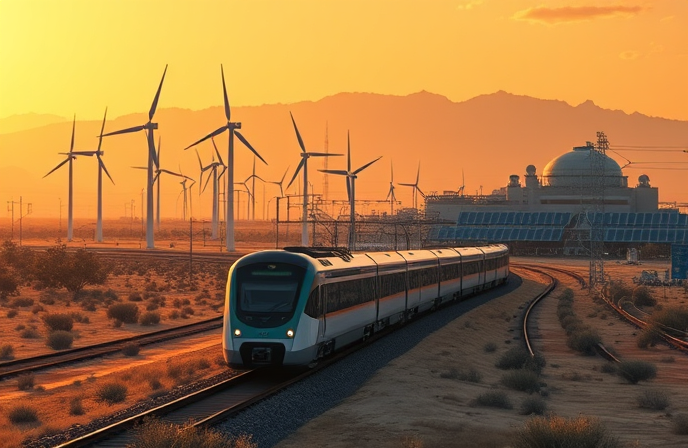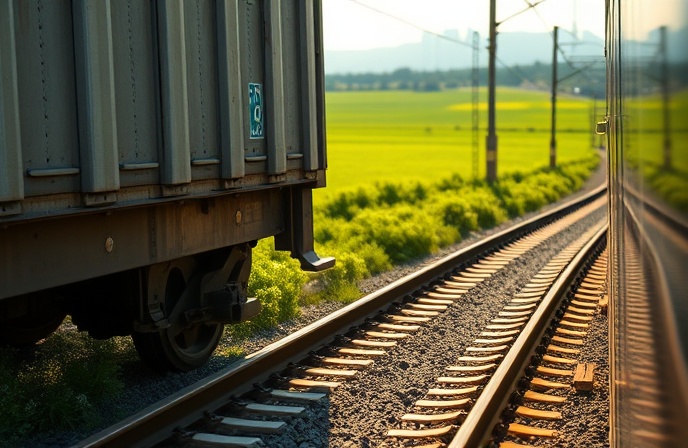Australia Rail: E-Fuels’ Decarbonization Promise, Nordic Electrofuel
Saudi e-fuel plant signals global rail decarbonization push, potentially benefiting Australia.

E-Fuels: Australia Poised to Ride the Decarbonization Rails as Saudi Arabian Plant Signals Global Expansion
Nordic Electrofuel’s recent Memorandum of Understanding (MoU) for an e-fuel production plant in Saudi Arabia signals a significant step towards globalizing the decarbonization of rail networks, and Australia may be next in line to reap the benefits. The ambitious project, slated for completion by 2030, will bolster the company’s existing European focus. This article explores the potential of e-fuels, which are synthetic fuels produced from renewable energy sources, to revolutionize Australia’s rail transport sector. We examine how e-fuels work, their advantages over alternative green technologies, and how the development in Saudi Arabia might reshape the landscape of sustainable transportation Down Under. The article will also preview key topics to be discussed at the upcoming Rail Decarbonisation and Resilience Conference, highlighting the importance of e-fuels within the wider context of rail industry sustainability.
E-Fuels: A Primer on Production and Promise
E-fuels, also known as synthetic fuels, represent a promising pathway to decarbonizing the rail industry without requiring the extensive infrastructural overhauls associated with electrification or hydrogen-powered systems. The process starts with hydrogen production, combined with captured carbon dioxide to create a gas. This mixture then undergoes the Fischer-Tropsch (FT) process, a catalytic chemical reaction that converts the mixture into liquid hydrocarbons, which can be optimized for various end-uses, including aviation and rail. The beauty of this process lies in its potential for carbon neutrality or even negative carbon emissions, contingent on the source of its feedstock and energy inputs. A major advantage is their compatibility with existing diesel locomotives, eliminating the immediate need for costly infrastructure upgrades. Furthermore, e-fuels offer the benefit of being carbon-neutral and particulate-free, which is particularly advantageous in rail, where particulate matter (soot) can be more environmentally damaging than carbon dioxide.
The Nordic Electrofuel Vision: Meeting Global Demand
Nordic Electrofuel is at the forefront of e-fuel production, with a strategic expansion plan encompassing both Europe and the Middle East. The MoU for a facility in Saudi Arabia, alongside another in Oman, signifies the company’s commitment to meeting the future demand for e-fuels, especially from markets like Australia. The company’s Chief Executive Officer, Gunnar Holen, anticipates significant demand from Australia, which the new plants are designed to cater to. Current operations primarily focus on the European market, fueled by mandates around Sustainable Aviation Fuel (SAF) and ESAF. Holen notes that as more plants open, e-fuels will become more cost-efficient and widely adopted globally. In addition to projects in the Middle East, Nordic Electrofuel is actively developing multiple plants in Norway, and is engaged with partners in Canada and Sweden, further solidifying its footprint in the global energy market.
E-Fuels vs. Alternatives: Weighing the Options
While both hydrogen and electrification are popular clean transport options, e-fuels offer several advantages, particularly in terms of practical implementation and cost-effectiveness. Hydrogen trains, while attractive, face challenges in distribution and safety due to a lack of infrastructure. Furthermore, these vehicles carry a risk of explosion, which can increase public apprehension. Electrification, another popular alternative, relies heavily on a supportive grid, which can be a barrier for some. Holen stresses that quicker, cheaper, and more viable solutions, like e-fuels, are required for a speedy transition to a sustainable rail network. In contrast, e-fuels can be utilized in existing diesel locomotives without requiring new infrastructure.
Conclusion
The expansion of e-fuel production, spearheaded by Nordic Electrofuel’s ambitious projects in Saudi Arabia and Oman, presents a compelling solution for decarbonizing rail networks globally, with a particularly attractive proposition for Australia. These facilities, designed to meet future demand, will allow regions such as Australia to adopt a cleaner, more sustainable fuel source without having to invest in major infrastructure upgrades. By leveraging existing diesel locomotive infrastructure and reducing the environmental impact of rail transport through carbon-neutral and particulate-free fuel, e-fuels will play a vital role in the push toward a sustainable rail future. This development underscores the importance of the upcoming Rail Decarbonisation and Resilience Conference, where key industry figures like Gunnar Holen will delve deeper into these advancements and strategize for a more sustainable future for rail transportation.






